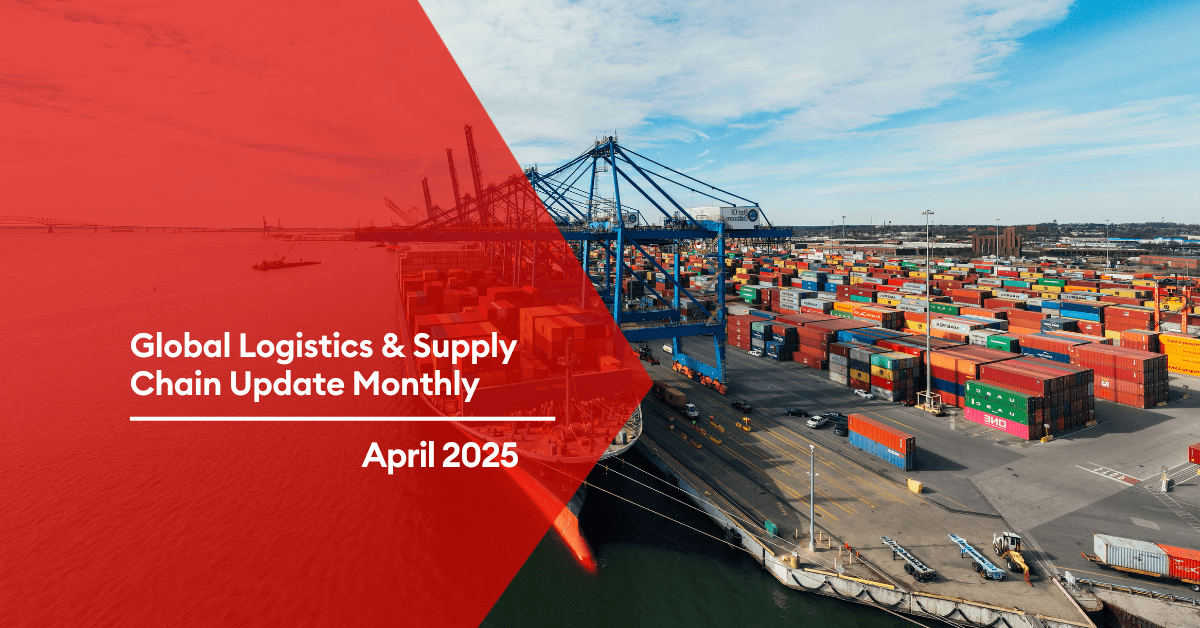
Market Updates for Logistics Industry – October 2022
The Supply Chain Issues Prevail!
The dynamic zero-COVID policy of China has to some extent impacted the manufacturing and inland logistics, even though the port restrictions are controlled. Similarly, in the United States, the port congestion has been eased in the South California, but the problem has now been shifted in the ports of Savannah and New York.
While in Germany the congestion is expected to ease in the following weeks as the strike actions have been called off, the United Kingdom hasn’t been that lucky. The industrial strike on Liverpool and Felixstowe port continues.
ME – North America
Due to the Golden Week demand, the rates are expected to remain soft with an open space and open capacity (except in a few pockets). The port and inland conditions are improving and transit time is also getting better over time.
Local Rates – Soft rates
Local Space – Open
Local Capacity/Equipment – Open (except a few pockets)
Note – Make sure to book 2 weeks prior to the Cargo Ready Date (CDR).
ME – Europe
The demand remains sluggish due to the cargo rush in this Pre-Golden Week. The schedule reliability is continued to be affected by the blank sailings and port omissions.
Local Rates – Pressure on spot rates
Local Space – Open
Local Capacity/Equipment – Open
Note – Expect flexibility in your shipments because of the expected delays and congestion.
ME – Mediterranean MED
The vessel congestion continues, which is causing delays in both origin and destination ports. The demand is getting soft and competitive spot rates are slightly increasing.
Local Rates – Competitive spot rates
Note – Delays are expected in some ports due to congestion.
Inbound Ocean
Source: DGF Global Forwarding | OFR Market Update | October 2022
North America – ME
The congestion issues are growing even more on the United States East Coast (USEC). This is because of the carrier capacity diversion from the West Coast on the Trans-Pacific eastbound (TPEB) trade lane. The condition on the East Coast is getting worse in comparison to the United States West Coast.
Local Rates – No change
Local Space – Fairly opened space
Local Capacity/Equipment – Moderate to Flat Capacity
Note – The congestion issues continue.
Europe – ME
The strike action may have ended on the ports of Felixstowe, but now the labors have announced a strike on Port of Liverpool, which is expected to cause trouble in service backlogs in Nort Europe. However, even though the peak demand has reached in Europe, the space options are gradually opening up.
Local Rates – No change
Local Space – Space options are opening as the demand goes down
Local Capacity/Equipment – Flat capacity
Note – Expected disruptions as strike on Ports of Liverpool begins.
Latin America
The things in Latin America are expected to be relieved due to the addition of a new service from MX EC to Med. South America East Coast is still struggling with the rising rates and capacity issues.
Local Rates – Upward trending rates
Local Space – Some space is available as the carriers are working on rearranging the services and optimizing the capacity.
Local Capacity/Equipment – Flat capacity
Note – Weather and infrastructure challenges at ports.
Asia Pacific
The general prospect remains flat due to the Golden Week Holidays. The rates are trending downwards, while there is a moderate decline in the capacity with relatively open space – which is why the overall market is stable for now.
Local Rates – Rates trending downward
Local Space – Relatively open
Local Capacity/Equipment – Moderate declining capacity & equipment available.
Note – The overall market is stable.
Air Freight Market Updates
Air Freight Demand – The global air market is facing mixed outcomes due to fuel price surge. However, the demand levels are expected to flatten in the coming time.
Carrier Capacity – The capacity is still suffering from the effects of COVID. Due to political and other reasons, the capacity of Europe and Asia is comparatively slow as compared to the other parts. According to Seabury, some of the freighters are using Middle East due to airspace closures over Russia.
Local Rates – The freight rate still remains significantly more than the one before COVID, besides the decrease in the demand.
The Middle East and Air Carriers ME
Based on the findings of IATA, the traffic of Middle East Airlines has increased 193.1% over the last year. The carriers in the area have successfully overcome the COVID challenges with a few changes in their business model and increased use of freighters for maximizing the revenue. In the coming years, the fleets in the region are expected to go up to 3,400 airplanes for passenger traffic as well as cardo demands.
Europe
The capacity in the European market continues to surpass the level of demand. In the coming months, the prediction is that the capacity will drop further, resulting in decrease of the passenger flight and an increase in the rates. However, the jet fuel prices are stabilizing and are low in comparison to the year’s start.
America
The export demand is steady in all markets, and the US airports are running at a normal pace. There is a massive increase in the demand to Hong Kong. Most of the carriers have increased the capacity number of passenger flights for the coming summer.
In Canada, there is a strain on the major airport’s infrastructure due to the heavy travel season in and out. As a result, it has created an indirect influence on the cargo import and export operations. Furthermore, Air Canada is adding more freight and passenger flights into Europe and Latin America through major gateways.
Asia
Before the Golden Week Holiday in the North of China, the demand appears to be weak. The rates of TPEB have slightly increased, whereas, there’s no change in the rates of Far East Westbound (FWEB). On the other hand, in the South, the rates continue to drop because of the low market demand. More so, there’s a chance of 1-2 additional days of transit due to the Shenzhen-Hong Kong border situation.
The Taiwan market is slack, but because it is the quarter’s end there is an anticipation that weekend capacity will be constrained. On the other hand, the Airlines in Taiwan announced to decrease the fuel surcharge, from October 1st, 2022.
Some parts of South East Asia continue to face trouble. The things do not seem to be improving for the Malaysian and Thai export markets as they are still soft. The market in the Vietnam is stable and some extra space has been added in the ex-Hanoi market.
Local News from United Arab Emirates – October 2022
CMA CGM shipping lines will now be charging a scanning fee of EUR 160/20′ | EUR 210/40′ & HC for all cargo coming to Congo. Read more
There has been a revision to the acceptance policy of shipment. No More Business (NMB) category won’t be able to make any bookings, and if so, it will be cancelled at the booking stage.
As per the rules set by Vietnam’s government in 2014, the consignee must have an import license to and submit the custom clearance 2 days prior to any Plastic Scarp Cargo vessel arrival to Vietnam.
Maersk is implementing a policy and making the 6-digit Harmonized System (HS) code that was announced by World Customs Organization (WCO) mandatory. It will now be an important part of shipping for all global cargo movements. The step was taken by Maersk to ensure the accurate commodity information to the custom authorities. See More
Factory Output News October 2022
In the last week of September 2022, the World Container Index (WCI) has reduced by 10%. The WCI for 40-foot containers is 61% below after the peak of last year and the value has come down to $4,014. This decline is due to the 19% drop in the freight rates from Shanghai to Genoa, and a 13% fall in the spot rates on Shanghai to Los Angeles. Similarly, the spot rates have decreased by 10% and 5% on Shanghai to Rotterdam and Shanghai to New York, respectively.
style=”user-select: text; -webkit-user-drag: none; -webkit-tap-highlight-color: transparent; overflow-wrap: break-word; white-space: pre-wrap; font-kerning: none; color: windowtext;”>
Euro Area
In the Euro Area, the manufacturing activities are slightly shrinking. During September, the manufacturing PMI was recorded at 48.4, which is less than in the previous months. This fall also indicates the biggest factory contraction since June 2020. The slide is also noted in output and the new orders due to high energy prices.
United States
China
The PMI of China is at the lowest in three months; the major reason being the new wave of COVID and energy shortage due to droughts. Apart from this struggle, the private sector seems to be growing more in comparison to the manufacturing sector as the new orders were affected by the increase in business of service providers.
United Arab Emirates
The PMI of UAE has dropped to 56.1 due to the risks included in global recession. In comparison to August 2022, the growth of new orders has reduced. However, the sales to abroad have increased, which has increased employment further. Luckily, overall confidence has increased since June and can end up in more order books.
Global Liner Performance: schedule reliability continues to improve in August 2022 (Read More)
INTERVIEW: Maersk Tankers will not raise pool fees to cover decarbonization, says CCO (Read More)
Upcoming significant changes to customs declarations in the UK (Read More)
Small Businesses Getting Squeezed Out in Push for Warehouse Space (Read More)
The failed takeover of Maersk’s box manufacturing arm offers respite to refer buyers (Read More)
UAE logistics market is to grow by 8.41 percent annually to reach $31.4 billion by 2026, says ADQ study (Read More)
UAE logistics market to reach $31.4bn by 2026 on e-commerce boost (Read More)
Related Articles
April 2025 Global Logistics & Supply Chain Market Update
U.S. Section 301 Proposals and Global Shipping Dynamics Global Trade Disruptions & Rising Costs
March 2025 Global Trade & Logistics Market Update
Ramadan 2025: Road Restrictions and Their Impact on Logistics in Abu Dhabi With Ramadan 2025 approac
Monthly Update on the Global Logistics Market – February 2025
Major Shifts in Carrier Alliances Reshape Global Shipping Dynamics 2025 marks a pivotal year in the






